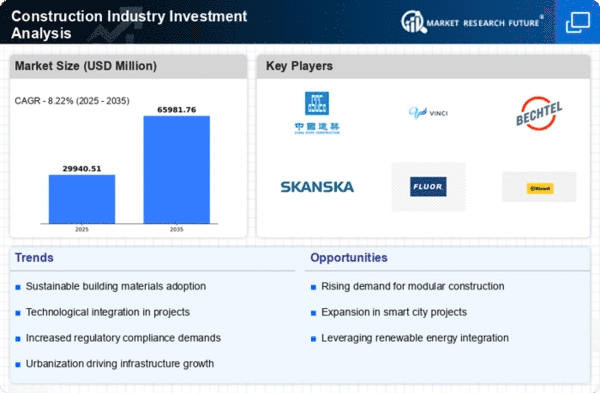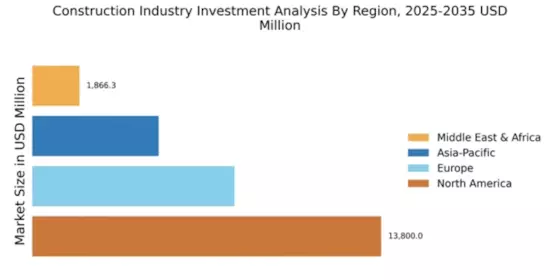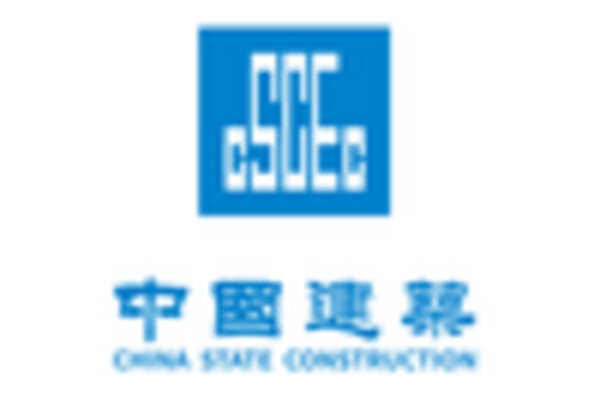Urbanization Trends
Urbanization trends play a pivotal role in shaping the Global Investment Analysis of Construction Industry in Indonesia Industry. With a rapidly growing urban population, the demand for residential, commercial, and public infrastructure is escalating. By 2035, it is anticipated that urban areas will require an investment of around 66.0 USD Billion to accommodate the increasing population and improve living standards. This surge in urbanization necessitates extensive construction activities, including housing projects, transportation networks, and public facilities. Consequently, the construction industry is likely to experience sustained growth, driven by urbanization and the need for modern infrastructure to support economic development.
Government Policy Support
Government policy support is a crucial driver in the Global Investment Analysis of Construction Industry in Indonesia Industry. The Indonesian government has implemented various policies aimed at attracting foreign direct investment (FDI) in the construction sector. These policies include tax incentives, streamlined permitting processes, and investment guarantees, which collectively enhance the investment climate. Such supportive measures are expected to bolster investor confidence, leading to increased capital inflows into construction projects. As a result, the construction industry is likely to benefit from enhanced funding and resources, facilitating the execution of large-scale projects and contributing to the overall growth of the sector.
Market Growth Projections
The Global Investment Analysis of Construction Industry in Indonesia Industry is characterized by robust market growth projections. The construction sector is expected to expand significantly, driven by increasing investments in infrastructure and urban development. The market is projected to reach 27.7 USD Billion in 2024 and is anticipated to grow to 66.0 USD Billion by 2035, reflecting a strong compound annual growth rate (CAGR) of 8.22% from 2025 to 2035. This growth trajectory indicates a favorable investment climate, attracting both domestic and foreign investors. The construction industry is likely to play a vital role in Indonesia's economic development, contributing to job creation and enhanced living standards.
Sustainability Initiatives
Sustainability initiatives are becoming increasingly relevant in the Global Investment Analysis of Construction Industry in Indonesia Industry. As global awareness of environmental issues rises, the construction sector is under pressure to adopt sustainable practices. The Indonesian government is promoting green building standards and sustainable construction methods, which are expected to attract investments. By prioritizing eco-friendly projects, the industry can tap into a growing market segment that values sustainability. This shift towards sustainable construction not only aligns with global trends but also positions Indonesia as a leader in environmentally responsible construction practices, potentially enhancing its attractiveness to international investors.
Technological Advancements
Technological advancements are reshaping the landscape of the Global Investment Analysis of Construction Industry in Indonesia Industry. The adoption of innovative construction technologies, such as Building Information Modeling (BIM) and prefabrication, is enhancing efficiency and reducing costs. These technologies enable construction firms to optimize project management, minimize waste, and improve safety standards. As the industry embraces digital transformation, it is expected that productivity will increase, attracting further investments. The integration of technology in construction processes not only streamlines operations but also aligns with global sustainability goals, making the Indonesian construction sector more competitive on the international stage.
Infrastructure Development Initiatives
The Global Investment Analysis of Construction Industry in Indonesia Industry is significantly influenced by ongoing infrastructure development initiatives. The Indonesian government has prioritized infrastructure projects, allocating substantial budgets to enhance connectivity and urban development. For instance, the government aims to invest approximately 27.7 USD Billion in infrastructure in 2024, which is expected to create a ripple effect in the construction sector. This investment not only addresses the existing infrastructure gaps but also stimulates economic growth, attracting foreign investments and fostering public-private partnerships. As a result, the construction industry is poised for robust growth, with a projected CAGR of 8.22% from 2025 to 2035.

















